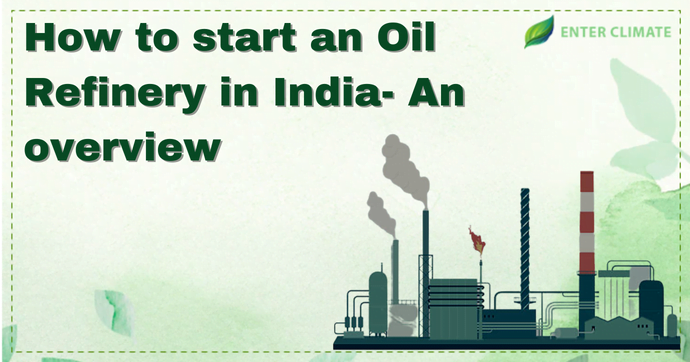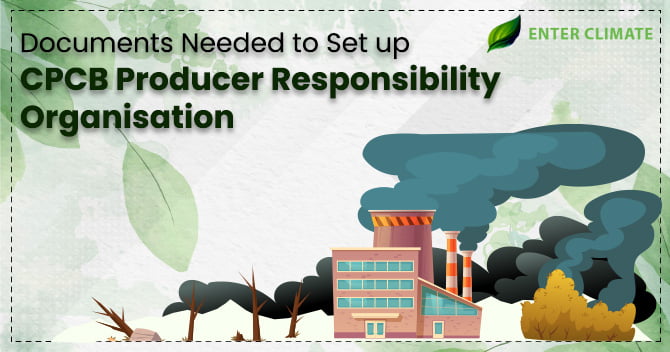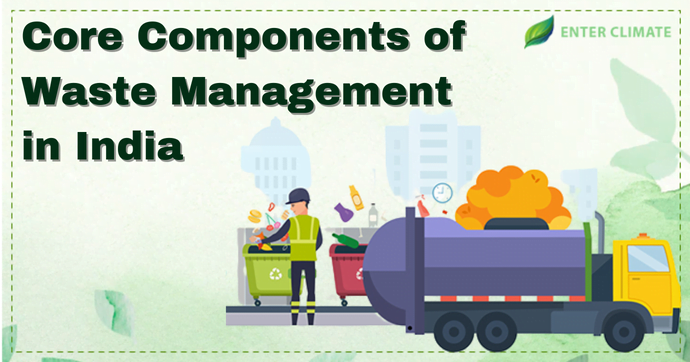How to start an Oil Refinery in India- An overview
 17 Nov, 2022
17 Nov, 2022 
Oil refining is the processing and refining complex mixture of hydrocarbons (crude oil) into several component mixtures of hydrocarbons. Refining breaks down crude oil into various components based on density into new products, primarily LPG petrol, diesel, kerosene, greases, wax etc. About 40% of the total petroleum oil refining is done by the private sector today. As oil demand in the country is estimated to grow double the current rate to reach 11 million barrels per day by 2045 and the demand for diesel is expected to increase to 163 MT by 2029-30, the government is keen on providing new opportunities for private players to enter the refining segment to enhance the production capacity. There are 23 refineries in the country, from which 18 are in the public sector, two in the joint venture and three are in the private sector. Being a crucial industry for the economic growth of a country, the government has installed various measures to ensure the growth of this industry through licences and authorisations. However, the requirement for more oil refineries exists today. Therefore, an intelligent approach to entering this business is through the guidance and assistance of experts with experience in the business’s legalities. So continue reading to get a complete overview of How to start an Oil Refinery in India. Let’s understand the refining process to get an idea of the working of a refinery.
Process of Oil Refining
Precise planning on how to start an oil refinery must include knowledge of the process of crude oil refining. Crude oil goes through a series of refining and separation stages that can be categorised into 3 three steps.
Step 1: Separation Stage: This stage includes the separation of crude oil into its significant constituents using three separation techniques: atmospheric distillation, vacuum distillation, and light ends recovery (gas processing)
Step 2: Conversion process: Coking, cracking, and visbreaking processes break large petroleum molecules into smaller ones. Polymerisation and alkylation processes combine small petroleum molecules into larger ones.
Step 3: Treating process: Undesirable elements such as sulfur, nitrogen, and oxygen are removed by hydrodesulfurisation, hydrotreating, chemical sweetening, and acid gas removal. Treating techniques are employed primarily for the separation of petroleum products.
Laws regulating the oil Refining Business
The oil refining industry has shown a surge in demand, and private players are investing in this opportunity. However, the business has to function under the provisions governing the refining business. Such establishments must know the laws that regulate the entire process of starting an oil refinery in the country. These laws include
The Petroleum Act, 1934: This act regulates the import into India, transfers within, storage, production, refining and blending of petroleum and deals substantially with midstream activities.
The Oilfields (Regulation and Development) Act, 1948: This act constitutes the basic statute for licensing and leasing of petroleum and gas blocks by the Government of India.
The Petroleum and Natural Gas Rules, 1959: These rules provide a framework for granting exploration licenses and mining leases.
A step-by-step guide to installing Oil refinery in India
A clever approach towards how to start an oil refinery must include the technical know-how of the refining business. This requires substantial investment in manpower, planning, land, machinery & infrastructure and raw material. Therefore, setting up an oil refining facility will need the following.
Crude oil supply
Almost 90% of the crude oil requirements of India are met through imports as the country does not have sufficient crude oil reserves. Purchase of crude oil, therefore, involves negotiations of contract floating of tenders, shipping arrangements, loading and unloading at ports and transporting to refineries. Crude imports are done separately by the oil companies, including the state-run oil marketing companies (OMC), private sector and joint venture companies.
Sourcing Refining Equipment
Besides the land and capital required to set up the oil refinery, the entrepreneur will also need equipment like gas process plants, vessels and columns, gas treating plants, LPG storage tanks, process equipment, propane tanks, pressure vessels, fired heaters, piping systems, heat exchangers, pumps and compressors etc.
Authorisation and Licences required to set up an Oil Refinery in India
The entrepreneur will require many licences and certifications, which the Government of India has mandated, to start an oil refinery plant and sell oil. If one needs a clear idea about how to set up an oil refinery, one must have knowledge of the licencing process for this industry, which includes
Environmental Clearance: As exploration activities in the crude oil sector are placed in Category B2 in the EIA Notification, refiners who need exploration rights for oil require environmental clearance. The documents required in this regard are
- Detailed Project Description
- Site/ Layout plan
- Proof of installed machinery
- Proof of Land Ownership
- ID proof of Signatory
- Quality test Report (if applicable)
- Proof of accident mitigation measures implemented
- Proof of water and Electricity connection
Pollution NOC: Pollution NOC is required by any refining facility that emits different industrial waste, and obtaining this NOC must be the priority towards how to start an oil refinery. Consent to Establish and Consent to Operate will be needed for a petroleum oil refinery under Air Act and Water Act. The oil refinery falls under the red category of industry in the CPCB list of industries and is categorised as highly polluting. ThereforePollution, NOCs must be obtained before starting the facility’s setup process. The documents needed in this regard are
- Duly-filled online Application Form
- Signed Undertaking
- Site Plan
- Detailed Project Report
- Layout plan
- Details of finished products
- Details of the manufacturing process
- including a list of machinery
- Land Ownership documents
- Industry Registration Proof
- Balanced Sheet Certified by a CA
- Details of pollution control devices provided on the premises, along with capacity and exit points of the industrial discharge)
- Consent fee (as applicable)
- Laboratory report of the industrial discharge
- Environmental clearance
Additional Licences Required by Petroleum Oil Refinery
- Authorisation for hazardous waste management
- Building plan approval from the Municipality
- Water supply sanction and connection from ULBs
- CGWA NOC for Water Abstraction
- Factory Licence
- Fire NOC (No Objection Certificate)
- GST Registration
- Explosive license
Licences to Process, Refine, sell or Export Petroleum Products.
The requirements and restrictions for refining and processing oil and gas are contained in the Petroleum Rules, 2002, issued under the Petroleum Act[1]. These rules require the prior approval of a refinery, including any alterations by the chief controller. The rules also mandate that permission to carry out maintenance or repair work must be obtained in writing in compliance with the Oil Industry Safety Directorate.
Licence to transport and Store distilled Petroleum products
The Petroleum Rules and The Petroleum & Natural Gas Regulatory Board Act (‘PNGRB Act’) contain the rules governing the transport, storage and import of petroleum in the country. The Petroleum and Explosives Safety Organisation regulates the transportation of crude oil by land and water under the Petroleum Rules, 2002 and the Petroleum Act. The refining unit will need a License for storing petrol, diesel and naphtha from the District Collector. The Documents required are
- SSI / IEM / LOI / EOU Registration
- Affidavit on Rs.10/- (Notary)
- Site Map
- VAT certificate
- Copy of the letter issued by the Oil Companies
- Sale Deed/Rental Deed
- Explosive license
Scope of the Oil Refining Industry in India
India’s petrochemical market grew at a CAGR of 10% and is expected to reach the 100 billion USD mark by the end of 2022. The oil refining industry attracted25 billion of USD in investment in exploration and refining in 2022. The reason was that petroleum consumption increased at a rate of 4.5% to 213.22 MMT in the past few years. The oil extraction and refining industry has always attracted FDI (foreign direct investments) too. According to data released by the DIPP, the petroleum refining sector attracted FDI worth 6.86 billion USD between April 2000 and September 2017. FDI of up to 100%has been allowed in the Oil and Natural Gas (O&NG) sector. This is because the landscape in the O&NG sector has dynamic with scope for the growth of business entities. India’s potential in the oil refining sector is immense, and there exists vast headroom for discoveries if you are searching for how to start an oil refinery.
Conclusion
India has witnessed spectacular growth in the oil refining sector over the years. From a deficit scenario in 2001, India achieved self-sufficiency in oil refining, and today we are a major exporter of Quality Petroleum Products. India is the global refining hub with a refining capacity of 248.9 MMTPA and is the fourth largest in the world after the United States, China and Russia. To cut export dependencies, the government is poised to promote the domestic oil refining industry. The question of how to start an oil refinery may seem challenging, but guidance and assistance from experts in the field can make this journey successful.













